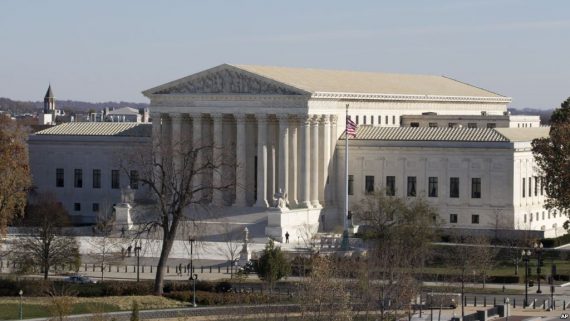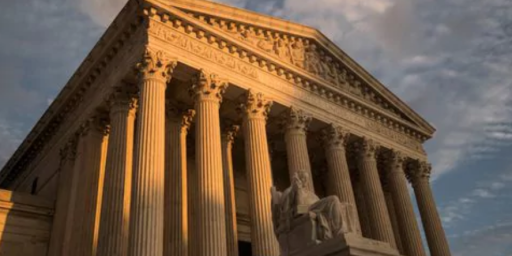Supreme Court To Hear Case That Could Deal Major Blow To Public-Sector Unions
Tomorrow, the Supreme Court will hear oral argument in a case that could prove crippling to public employee unions across the nation.
On Monday, the Supreme Court will be hearing oral argument in a case that has the potential to vastly weaken the power of public employee unions across the nation:
CHESTER, Ill. — Randy Clover is something of an anomaly — the president of a union local here that represents Illinois state employees, and a Republican precinct leader who voted for President Trump. But he has no doubt about what will be at stake next week at the Supreme Court: the financial and political clout of one of organized labor’s last strongholds.
The court will hear arguments on Monday about whether the government employees represented by Mr. Clover’s union, the American Federation of State, County and Municipal Employees, must pay the union a fee for representing them in collective bargaining. Conservative groups, supported by the Trump administration, say the First Amendment bars forcing government workers from having to pay anything, and the court has sent strong signals that it agrees with that argument.
If it does, unions like Mr. Clover’s stand to lose fees not only from workers who object to the positions they take in negotiations but also from anyone who chooses not to join a union but benefits from its efforts. To hear Mr. Clover tell it, the case is the culmination of a decades-long assault against the labor movement.
“The case was started by the governor to destroy unions,” Mr. Clover said, referring to Gov. Bruce Rauner, a Republican who has been at war with Illinois’s public-sector unions. “It’s trying to diminish the protections that unions have for their members.”
A ruling against public unions is unlikely to have a direct impact on unionized employees of private businesses, because the First Amendment restricts government action and not private conduct. But unions now represent only 6.5 percent of private sector employees, down from the upper teens in the early 1980s, and most of the labor movement’s strength these days is in the public sector.
Groups financed by conservative donors have worked hard to weaken public unions, and denying them the ability to impose mandatory fees on workers has been a long-sought goal. The argument almost succeeded in 2016, when the Supreme Court seemed poised to rule that the fees were unconstitutional.
But Justice Antonin Scalia died not long after the earlier case was argued, and it ended in a 4-to-4 deadlock. The new case, which had been filed in 2015, was waiting in the wings and soon reached the Supreme Court. By the time the justices agreed to hear it, Mr. Rauner’s claims had been dismissed, and the case is now being pursued by Mark Janus, a child support specialist for the State of Illinois.
The Supreme Court is back to full strength with Mr. Trump’s appointment of Justice Neil M. Gorsuch, and most observers believe the new justice will join the court’s other conservatives to deliver a decision that will hurt public unions.
Mr. Janus’s lawyers said the case is about freedom of speech and association. The activities of public unions are akin to lobbying, they said, and so are by their nature political. Forcing unwilling workers to pay for such activities violates the First Amendment, they added, by compelling them to support messages with which they disagree.
“We argue that you shouldn’t have to check your First Amendment rights at the door when you take a government job,” said Jacob H. Huebert, a lawyer with Liberty Justice Center, a conservative litigation group.
Mr. Clover and Mr. Janus are both represented by Council 31 of the union. But Mr. Janus, who works at the Illinois Department of Healthcare and Family Services in Springfield, objects to paying what the union calls “fair share fees” and others call “agency fees.”
“I was forced to pay these fees,” Mr. Janus said. “Nobody asked me.”
He added that he disagrees with stances taken by the union. “They use that money in these agency fees to support their different causes and views,” he said.
As it was with the case that the Supreme Court heard oral argument in just before Justice Scalia’s death, there is much consternation on the left regarding the prospect of the blow that this case could give to major public employee unions such as AFSCME and SEIU. Instead, what we’re seeing here is what is likely the final step in a years-long effort to chip away and challenge the Court’s ruling in a 1977 case called Abood v. Detroit Board of Education in which the Court essentially legalized the “closed shop” for public sector employees, meaning that an employee for a local, state, or Federal agency or department could be required to join a union and pay dues as a condition of employment. For years, critics of forced unionization sought to overturn Abood, but it has only been with the rise of the current largely conservative Supreme Court that they have been successful in their efforts.
While there were several minor cases along the way, the legal moves really began with the Court’s 2014 decision in a case out of Illinois. In that case, an Illinois law attempted to require mandatory unionization of home healthcare workers who participated in the state’s Medicaid system. In that case, Harris v. Quinn, the Court invalidated the rule but did not go as far as many observers thought they would and attack the precedent established by Abood itself. The next challenge came about a year later in a case titled Friedrichs v. California Teacher’s Association, which the Court accepted for review at the end of its October 2014 Term. When the Court heard the case in January 2016, it appeared that there was at least a 5-4 majority ready to essentially overturn Abood and rule the collection of mandatory union dues unconstitutional. Within a month after that decision, though, Justice Antonin Scalia died and the Court was left with a split that ended in a 4-4 ruling that allowed the Ninth Circuit Court of Appeals decision upholding the fees to stand but left both sides of the debate somewhat disappointed at the lack of a final resolution of the matter. Now that the Court is back to a full complement of nine Justices, with the conservative wing of the party back to full strength, it seems clear that it will be difficult if not impossible for the Justices to avoid dealing with the Abood precedent and the fundamental issues that it presents. Given the majority in Harris, and the likelihood that Justice Gorsuch will side with his fellow conservatives, it seems as though the odds are quite good that the Court will rule against the union and provide public employee unions across the country with a significant, if not fatal, blow to their power and influence.
Based on the filings in this case and the Court’s previous decisions in this area, it seems clear that there are serious First Amendment issues involved in this case and those like it. This is true not only in the manner in which someone in the Plaintiff’s position is required to become a member of a union and contribute fees that are spent not only on collective bargaining but also to lobby for political positions he doesn’t support and to donate to candidates he is opposed to. Given the fact that these are government positions, the fact that employees are effectively required to contribute to causes they disagree raises real First Amendment concerns. The counter-argument to this position, of course, is that ruling that allowed employees such as the Plaintiff to exempt themselves from paying dues to the public employee union would turn them into a “free rider” who benefits from the union’s collective bargaining efforts without paying dues to help pay for them, Even conceding that point though, it strikes me that, by itself, the “free rider” argument is not a sufficient answer to problem created when union dues are used for purposes not related to bargaining. The law is fairly well-settled that people cannot be compelled by the state to speak on political matters as a condition of employment, and even under a system where the dues collected are reduced to cover only “non-political” activities, the fungible nature of money means that the dues that are paid ultimately do help subsidize speech that a member may disagree with. One solution to that, obviously, would be strict requirements that unions limit their activities to collective bargaining, but that raises First Amendment problems of its own and would be largely unenforceable. In any case, the problem of compelled speech is one that was at the center of Harris and Friedrichs and it will likely play a role in this case as well.
Beyond the legal issues, there are also legitimate questions about the entire idea of public employee unions that have been raised in the past, not only by conservatives, but also by President Franklin D. Roosevelt himself:
Roosevelt’s reign certainly was the bright dawn of modern unionism. The legal and administrative paths that led to 35% of the nation’s workforce eventually unionizing by a mid-1950s peak were laid by Roosevelt.
But only for the private sector. Roosevelt openly opposed bargaining rights for government unions.
“The process of collective bargaining, as usually understood, cannot be transplanted into the public service,” Roosevelt wrote in 1937 to the National Federation of Federal Employees. Yes, public workers may demand fair treatment, wrote Roosevelt. But, he wrote, “I want to emphasize my conviction that militant tactics have no place” in the public sector. “A strike of public employees manifests nothing less than an intent on their part to prevent or obstruct the operations of Government.”
And if you’re the kind of guy who capitalizes “government,” woe betide such obstructionists.
Roosevelt wasn’t alone. It was orthodoxy among Democrats through the ’50s that unions didn’t belong in government work. Things began changing when, in 1959, Wisconsin’s then-Gov. Gaylord Nelson signed collective bargaining into law for state workers. Other states followed, and gradually, municipal workers and teachers were unionized, too.
George Will, meanwhile, argues that it is long past time that Abood is overruled:
In private-sector collective bargaining, management and labor negotiate how to distribute companies’ profits. No comparably adversarial process exists in the public sector. There government, which acquires its “profits” (revenue) from a third party — taxpayers — “negotiates” with unions that have an interest in government doing what it wants to do anyway: expand. Because government is both employer and policymaker, collective bargaining by the union is inherently political advocacy and indistinguishable from lobbying. Hence in 2012 the court acknowledged that compulsory fees are “compelled speech and association” implicating on First Amendment rights. President Franklin Roosevelt was right: “The process of collective bargaining, as usually understood, cannot be transplanted into the public service.”
Although organized labor’s portion of the private-sector workforce has plummeted from around 35 percent in 1953 to 6.5 percent today, it now organizes about one-third of local, state and national government workers. Organized labor now is primarily governments organized as interest groups.
Union officials’ salaries and benefits are the biggest expense of the union that Janus is forced to finance (the American Federation of State, County and Municipal Employees). It is facially implausible that most of what these officials do is devoted exclusively to collective bargaining and is hermetically sealed from AFSCME’s aggressive promotion of its broad political agenda. Besides, money is fungible: Money extracted from reluctant nonmembers can fund activities that otherwise would have been paid for with money that now can be devoted to other political causes.
And AFSCME’s approximately 3,400 local unions calculate their own supposed “collective bargaining” allocations. So each enjoys vast discretion in deciding which of its expenditures are germane to collective bargaining, and therefore what their nonmembers owe to the union.
Many Democrats are, or say they are, distraught about “big money” and there being “too much” money in political campaigns. They will, however, be seriously distraught if help arrives by Junewith Janus winning. This will stop the coerced flow of money to government workers’ unions, which in the 2016 election cycle spent $63.9 million on politics, 90 percent supporting Democratic candidates and causes.
We’ll have a better idea of where the case stands after oral argument on Monday. Given the majority in Harris, though, and the fact that Justice Anthony Kennedy voted with the majority in that case, and with the Court’s conservative wing in Friedrichs two years ago, it seems likely that there are sufficient votes to overrule Abood once and for all and strike a strong, but much needed, blow to a segment of the labor movement that has accrued undue power and influence for decades now. I’ll be recapping the Court’s oral argument on Monday, but in the meantime, you can head over to SCOTUSblog’s information page for the case if you want to learn more or read any of the pleadings that have filed in advance of the argument themselves.






I’ve been a public employee much of my life—uniformed military, state universities, and now a DoD civilian—and am skeptical of full unionization. We ought to have some collective bargaining rights in terms of representation, the filing of grievances, and the like. But, no, we ought not have the right to strike against the society which employs us.
And I’ve never understood the notion that unions ought have the ability to coerce membership fees as a condition of work. It’s extortion, plain and simple. Frankly, the benefits of belonging should be sufficiently attractive on their own merits as to have employees eager to join.
I’ll admit my bias upfront – I’ve never supported public sector unions. Like James, I’ve been a federal employee, albeit in a non-bargaining position.
Unions in the private sector – or at least the threat of unionization – is a necessary check on potential excesses by private employers. But in the public sector, unions now control both sides of the negotiation and the result is devastation to the balance sheets for state and local government.
I can’t speak to the merits of this case, but IMO public sector unions are currently too powerful and their priorities negatively impact effective and efficient governance.
@Andy:
This feels to me like a situation where Conservatives, if on the other side of the argument, would scream about legislating from the bench.
If public sector unions are too powerful, then that should be a legislative priority.
To James’ comment above around coercion of membership fees, the premise has always been that everyone benefits from the negotiations and rules-adherence that the union reps assure – so everyone should pay.
Perhaps the accommodation for those who do not wish to pay is to instead get individually negotiated ‘market’ wages and working conditions – a two-tiered system. My guess is that wouldn’t go well for the non-represented.
The “free rider” argument is conceded above, however I don’t think you can so easily separate lobbying, recruitment, publicity and other activities from the results garnered for union members.
This isn’t directed at Doug in particular, but I have to wonder about the strength of someone’s argument when he would use something said by FDR to defend the crushing of public-sector unions while demeaning just about every other idea by FDR as some kind of horrible liberal/leftist/socialist/communist problem…
@Andy:
This cannot be actually true and also have lawsuits by government actors against unions.
So, a corporation with an exclusive government contract that also engages in political lobbying that some of its employees and shareholders may disagree with is fine, but a union with an exclusive government contract that also engages in political lobbying that some of its members may disagree with is unConstitutional. Ok, then. I guess the unions should just restructure themselves as employee-owned corporations and bid for government contracts. Problem solved for everyone!
George Will writes:
Clearly, when George Will dies he will find himself condemned to an eternity as a GS-7 with a shitty boss.
@James Joyner:
Unless you would say the same about private sector employees — that they ought to have those rights, but not the right to strike — you’re being a disingenuous ass. The right to strike is the ONLY right that guarantees the others.
Public sector employees are not striking “against the society which employs them” — unless you want to argue that government employees are always the perfect embodiment of the general will. Care to make that argument? I didn’t think so.
It’s not society that employs you, though; it’s the government acting in its capacity as an employer, which numerous SC precedents have confirmed changes the nature of the relationship.
Do you similarly disagree with private companies having the right to require employee contributions to group benefit plans that individual employees might not want or might even disagree with or to otherwise set the terms of employment? If you don’t find that objectionable, why do you find it objectionable in the context of a union?